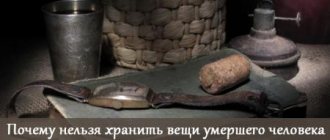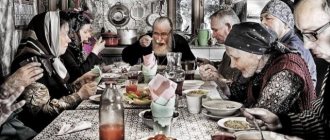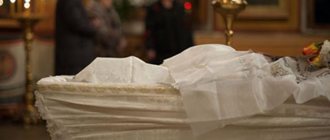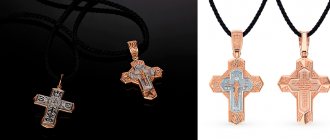Orthodox Christians have a tradition of giving away things and sweet treats to commemorate a deceased person. There are different customs in different areas, and there are differences in what and how is distributed on different memorial dates. These beliefs explain how many sweets should be in each bag prepared for funeral alms, what exactly is given to those who come to the funeral, on the 9th, 40th days, for six months and a year. They advise when to give away the deceased’s belongings. However, theologians are confident that trying to observe all these rituals too strictly is not only unnecessary, but even harmful. After all, the main thing in commemoration is respect for the deceased, prayers for the repose of his soul and good memory of his earthly deeds.
Why do people give away things at funerals and wakes?
Giving gifts to people who came to funerals and wakes is an ancient pre-Christian rite that has been known since the times of Kievan Rus. Adhering to a long-standing custom, small memorial gifts and refreshments are now also distributed. This tradition is also supported by Orthodox priests, because remembering the deceased means pleasing God. This is why they distribute scarves, towels and other items, so that a person, using this item, remembers the deceased with a kind word.
Such memory frees the soul of the deceased from sins and facilitates its path to the Almighty, as well as its presence in the other world. If the deceased person is not remembered, his soul cannot calm down. The relatives of the deceased suffer from insomnia and nightmares.
But why handkerchiefs are handed out at funerals is an interesting question. In some places, such a handkerchief is used to wrap a burning candle during a funeral service, which is held in the hands. Then the dripping wax will not burn the skin. What else do people need handkerchiefs for? - probably to wipe away tears during the funeral.
How to ease the fate of the soul in perea and how to properly see off the soul of the deceased for the day from home
Not only the number of sins affects the presence of the incorporeal shell in a new form, but also the behavior of relatives, their thoughts, actions - everything affects the soul.
Rules of conduct for relatives in the house
A Christian should not do cleaning; it is especially not recommended to touch the things of the deceased or throw them away. This is due to the fact that the soul of the deceased is still nearby. If she sees her favorite things being taken out of the house, she will feel pain. Its cause is not only the loss of a familiar life, but also the disrespect shown by relatives. Other rules that must be followed until the fortieth day after death arrives:
- cover reflective surfaces;
- leave the night light on before going to bed;
- no one should sleep on the bed of the deceased until 40 days have passed after death;
- It is not recommended to speak loudly if the deceased is still at home (his coffin is standing);
- You cannot laugh before the funeral, and strong manifestations of grief are not welcome.
Icons and church candles
Observance of mourning and grief
Commemoration is not the only duty of relatives after the burial of the deceased. There are other rules that must be followed:
- no major celebrations are held: birthdays, weddings, etc. should not be celebrated;
- loved ones are in mourning: they may wear dark clothes or not, external manifestations are not the most important;
- You should not raise your voice - quarrel, get into altercations;
- you cannot wear jewelry;
- It is recommended to light candles and say prayers in front of them;
- You cannot share your grief and the pain of loss with strangers.
Duration of the period when external manifestations of grief persist:
- husband or wife: at least 6 months, representatives of individual faiths determine the duration of this period in their own way, for the Orthodox it is enough to mourn for 40 days (wear a mourning bandage, black clothes);
- mom and dad will grieve much longer when a daughter or son dies (according to the canons, 1 year);
- if an uncle or aunt dies, it is customary to mourn for 3 months;
- Grandmothers and grandfathers – for six months, they grieve for a brother or sister for the same amount of time.
Prayers to help the living and the deceased
The Holy Fathers themselves composed prayer texts. This requires a special status. The first prayer of permission was written by Theodosius of Pechersk in the 11th century. Another theologian compiled 13 funeral stichera; they are still read during funeral services for the deceased. All this confirms that the prayer word for the dead is the main help. Sacred words also help the readers themselves: this makes it easier to come to terms with the pain of loss. Not everyone can step away from it to understand: the soul suffers when it sees the groans of loved ones during a funeral.
You can ask the Lord for the deceased, as well as for yourself - to pray to find the strength to overcome this test. Monks, monks and other enlightened clergy have repeatedly seen how commemoration has a positive effect on the state of the soul. While going through the ordeal, the deceased suffers, and after reading the prayer, their visions changed - the sinner’s face became brighter.
Ultimately, Christ forgave the sins of the person for whom loved ones asked. This opened the way to heaven.
Prayer for the soul of the deceased
What do they give out on the day of the funeral?
The Bible does not give an exact answer on this matter, so the relatives of the deceased adhere to local customs. It turns out that the lists of donations differ in different regions. In some places they give gifts only with spoons, fearing the sad energy that other utensils absorb. Others, to preserve the fond memory of a deceased relative, give saucers, mugs or plates to everyone who came to say goodbye.
What is usually distributed at a funeral in memory of the deceased: towels for the men who carry the coffin, for children and women - sweets, cookies and baked pies. What they hand out at wakes on the day of a funeral are handkerchiefs. Textiles are purchased specifically when preparing for burial.
What else do Christians give out to people at funerals after the wake - dishes with spoons, bags of food or candy, and sometimes gifts of socks. Small soap is added to small towels in some places.
Organizing a wake at home or in a cafe. Rules
Relatives today more often order a cafe or canteen for a funeral service. This event is not held at home, because quite a lot of people gather after the funeral. This tradition existed before. Today, it is important to hold home funerals on the first and subsequent anniversaries, when only the family of the deceased gathers. Other rules:
- the duration of the meal is 1-2 hours;
- guests express condolences to the family of the deceased, and directly during the wake, everyone remembers the deceased, tells a short story about him or reads a prayer;
- There should be only spoons on the table; the use of forks and knives is not encouraged;
- after the end of the meal, spoons are distributed to the guests;
- One seat is left free at the table, and cutlery must also be provided;
- there should be a photograph of the deceased on the table;
- Leave a glass of water in front of the photo frame and cover it with a slice of bread. If possible, organize a wake without alcohol.
Often they leave vodka instead of water in a glass in front of a photograph of the deceased; this is not recommended, because at first the soul still retains memory; the presence of alcohol can provoke wrong aspirations.
What are they giving away for 9 days?
On this day they go to church for a prayer service, and along the way they give refreshments to everyone they meet, especially children. Those who don’t go to church simply serve it to people at the church, treat neighbors and acquaintances. For 9 days they give a memorial service with baked goods, sweets, boiled eggs or coins. When treating, they ask to read a prayer for the repose of the departed servant of God, being sure to mention the name of the deceased, or to remember him with a kind word.
Relatives and invited family friends commemorate this day. The dinner is prepared modestly, because not a single dish or product from the funeral table can be thrown away. What remains must be given to guests or given to the poor.
Uneaten leftovers with crumbs are collected and taken out to birds or domestic animals. According to legend, birds that peck the funeral food are more likely to convey prayers to the Lord.
What prayer is read on the 40th day of death?
At home, you can say a prayer service for the repose of your soul in your own words, or read a prayer service to Saint War:
“Oh, venerable holy martyr Uare, we kindle with zeal for the Lord Christ, you confessed the Heavenly King before the tormentor, and you suffered earnestly for Him, and now the Church honors you, as you are glorified by the Lord Christ with the glory of Heaven, Who has given you the grace of great boldness towards Him , and now you stand before Him with the Angels, and rejoice in the Highest, and clearly see the Holy Trinity, and enjoy the light of the Beginning Radiance, remember also our relatives' yearning, who died in wickedness, accept our petition, and like Cleopatrine, the unfaithful race was freed from eternal torment by your prayers You, therefore, remember those who were buried against God, who died unbaptized, striving to ask for deliverance from eternal darkness, so that with one mouth and one heart we may all praise the Most Merciful Creator forever and ever. Amen".
The Lord is always with you!
What are they giving away for 40 days?
The fortieth day is the day when the soul of the deceased is finally determined where to stay. 40 days are celebrated with a wake at the table. What remains is traditionally taken by the guests along with the spoons they used. On the same day, relatives and friends are allowed to take from the things of the deceased something that will be kept as a memory. Neat and clean clothes are given to friends, given to poor people, or taken to church, which advises giving and not throwing away.
Handkerchiefs and textiles are purchased in advance when preparing for a funeral
On the 40th day before the funeral dinner, believers attend a memorial service in the church. Afterwards, everyone in the church and the poor on the porch are treated to sweets, buns, and sweet pies with a request to remember.
The Bible does not say anything about the strict requirement for this ritual and the distribution of exactly 40 items. According to theologians, the main thing is not how much food or things are given, but the bright memory of the deceased with prayers for the peace of his soul.
Cafe for funerals: criteria for selecting a place for a ritual event
The individual needs of those seeking funeral services, as well as the territorial location of the establishment relative to the cemetery, the house of the deceased or other landmarks will help determine the choice of place for the funeral meal:
- Near the bus station, railway station or airport, if there are a lot of visiting people at the funeral;
- For the same reason, you may need a canteen or cafeteria near the hotel.
Also, a cafe where a funeral can be held must provide the service of organizing funeral dinners. This guarantees that the staff is competently prepared for the event, as well as the availability of the dishes necessary for the meal on the menu. In modern society, there are several unchanged canons regarding treats for people present at a memorable event.
What is distributed for six months and 1 year after death
A funeral after 6 months is a new folk tradition that is not considered obligatory. Some gather relatives and close friends for the funeral table. Others simply offer food with a request to remember the deceased. The church orders a funeral service, donates money to the church for repairs and organizing holidays.
An anniversary is a more significant date. In the morning they go to church to order a memorial service and other memorial services. Kutya is consecrated for the funeral meal. Bags of food (not meat) are placed on a special table, which will then be distributed here or used to prepare lunch for those in need. It is allowed to supply Cahors wine and oil for lamps. You can also leave a monetary donation for the construction of the temple, or bring clothes. According to tradition, they commemorate with sweets and baked goods.
Holding a wake: entrust the chores of decorating the meal to professionals
When a person dear to you leaves this world, the last thing the people close to the deceased want to think about is formalities. Nevertheless, many burdens fall on the shoulders of relatives:
- Required documents;
- Notifying loved ones and employees about the tragic event;
- Financial questions.
Experiencing the grief of loss, organizing a ritual procession on your own can cause great difficulties for relatives. To avoid difficulties and not to miss important details, it is recommended to entrust responsibility for organizing the funeral and memorial meal to qualified professionals.
Mosgupritual's team of professionals aims to relieve family members of the deceased from the need to personally monitor the degree of readiness of each stage on such a tragic day. The set of preparatory measures that our service can offer also includes a memorial meal after nine, forty days or a year from the death of your loved one. She will allow you to once again remember with a kind word at the same table a relative, colleague, or friend who has left this world.
Representatives of the Mosgupritual bureau make sure that nothing prevents the relatives and friends of the deceased from accompanying the person on his last journey or once again, in time, honoring his memory. Contact us by phone.
Every person on this earth has two most important events in life - birth and death. Between these two events lies life.
For one person it is long, for another it is short, but in their lives people, as a rule, drive away the thought of death, thinking that they will live forever. But then death comes, and with it the inevitable bitter worries about burying someone dear to you.
Not often, but it happens that a person thinks about his future death and prepares a coffin for himself in advance. Such a product is usually stored in attics. But here there is a small but very significant “but”: the coffin is empty, and since it is made according to a person’s standards, he begins to “pull” it into himself. And a person, as a rule, dies faster. Previously, to prevent this from happening, sawdust, shavings, and grain were poured into an empty coffin. After the death of a person, sawdust, shavings, and grain were also buried in the hole. After all, if you feed a bird with such grain, it will become sick.
When a person has died and measurements are taken from him to make a coffin, under no circumstances should the measurement be placed on the bed. It is best to take it out of the house and put it in a coffin during the funeral.
Be sure to remove all silver objects from the deceased: after all, this is precisely the metal that is used to fight “the unclean.” Therefore, the latter can “disturb” the body of the deceased.
If there is a dead person in the house, do not do laundry. This must be done after the funeral.
When the coffin is being made, relatives and friends are prohibited from participating. It is best to bury the shavings formed during the manufacture of the coffin in the ground, or, in extreme cases, throw them into water.
The bed on which a person died does not need to be thrown away, as many do. Take her and take her out to the chicken coop, let her lie there for three nights, so that, as the legend goes, the rooster will sing her song three times.
When the time comes to place the deceased in a coffin, then they sprinkle holy water on the body of the deceased and his coffin, outside and inside. You can also cover it with incense. The body is then transferred to the coffin. A whisk is placed on the forehead of the deceased. It is given in church when the deceased is brought to the funeral service. The deceased's lips should be closed, his eyes closed, his hands folded crosswise on his chest, the right one on top of the left. A Christian woman’s head is covered with a large scarf that completely covers her hair, and its ends do not need to be tied, but simply folded crosswise. You should not put a tie on a deceased Orthodox Christian. An icon or cross is placed in the left hand of the deceased; for men - the image of the savior, for women - the image of the Mother of God. Or you can do this: in the left hand - a cross, and on the chest of the deceased - a Holy image. A pillow, usually made of cotton wool, is placed under the feet and head of the deceased. The body is covered with a sheet. The coffin is placed in the middle of the room in front of the icons, turning the face of the deceased with his head towards the icons.
When you see a dead person in a coffin, do not automatically touch your body with your hands. This is due to the fact that in the place where you touched your hand, various skin growths in the form of a tumor can grow.
Why do they hand out scarves and towels at funerals?
After lowering the coffin and farewell handfuls of earth into the grave, those present, according to ancient tradition, are given symbols of grief as souvenirs. The men who took part in carrying the coffin have a towel tied on their hands, and everyone else is given handkerchiefs. After the funeral dinner, headscarves are presented to women who took part in organizing the funeral and commemoration, as well as elderly close relatives. Therefore, they approximately calculate in advance how much you need to buy of both.
In some places, scarves are tied on the hands of everyone who came to the funeral, and this is done before the funeral procession begins. After burying the grave, the bandage can be removed.
When they distribute spoons, mugs, dishes
The church does not have strict requirements for the day of distribution of dishes. Some relatives of the deceased do this after the first wake. Others give guests dishes as a souvenir: plates, spoons on the 9th or 40th day. When organizing a wake in a catering establishment, pre-purchased spoons are placed on the table or dishes are distributed with good wishes when the guests leave. In this case, guests are asked not to take cutlery from the tables.
It is recommended that spoons and cups be made round in shape to preserve the positive energy and warmth of what was said about the deceased at dinner. The resulting item cannot be subjected to specific pagan rituals, because this is a sin. Enough to wash the dishes.
Towels and handkerchiefs are given to those who served as pallbearers and helped organize the wake.
Spoons and mugs
These items can be distributed on the day of the funeral, those who came for 9 days or on the fortieth day. According to tradition, at the end of the funeral meal, those who came to remember the deceased simply take with them the spoons with which they ate. If a wake is organized in a cafe or restaurant, they usually warn that no one takes the establishment’s equipment with them. To distribute such a commemoration, devices are specially prepared that can be given away before the guests leave. Good wishes are extremely important. Objects and treats given with bad thoughts will not benefit the spirit of the deceased.
There is an opinion that the round shape of spoons and cups is especially good at preserving good energy and the warmth of words spoken at the table. Like any other utensils, spoons or cups received in memory of the deceased should be washed. Carrying out any specific rituals inherent in pagan beliefs (with salt, fire, etc.) is not only unnecessary, but even harmful. In Orthodoxy, superstition and related rituals are considered a sin.
When are candies distributed and how many pieces?
The traditional treat on the day of the wake after a funeral, for 9 and 40 days, for a year is sweet: cookies, waffles, buns, sweets. They are treated to adults and children, neighbors, acquaintances and strangers, and brought to work. Sweets are served with a request for prayer for the repose of the deceased or a mention with a kind word, while when treating, it is required to tell his name.
Some people have a tradition of bringing purchased sweets or homemade cakes to the funeral. The brought treats are placed on the common table. After lunch, they are mixed with other sweets and distributed to departing guests, but it is not customary to indulge in gluttony by adding large bags.
According to legend, it is not necessary to put an even number of candies in a bag. The main thing is that the person, taking the candy, remembers the deceased kindly and wishes his soul a sweet, heavenly eternity.
Menu for a memorable dinner: features of the design of a memorial table
The list of basic dishes for a wake immediately after a funeral is not much different from the menu for a wake 40 days later. All meetings of memories are based on one set of dishes that should be followed:
- Kutia: boiled millet or rice with sweet syrup and dried fruits. Guests of the event must taste a few spoons of the sweet dish according to Christian canons. This symbolizes the happy life of the soul of the deceased in heaven.
- First course: those present are served borscht, cabbage soup or soup. It is suggested to try salty pies and bread with the hot dish.
- Side dish with meat: boiled potatoes with goulash are prepared as a second course. It is forbidden to use forks during the funeral meal; such food is easy to eat with a spoon.
- Drinks: during toasts of remembrance of the life of a person who has left this world, they drink Cahors, illuminated in the church. Compote is offered as an additional drink at the end of lunch.
Everyone who wishes to honor the memory of the deceased is given the floor at the table, and at the end of the dinner ritual, relatives distribute sweets and cookies to the friends of the deceased, employees and other people present at the event as a token of gratitude. Sweets will be another reason to remember a person with a kind word.
A knot for a person after a funeral
Orthodox Christians have a tradition that prevents evil forces from harming living people, and also facilitates the entry of the soul of the deceased into the afterlife. According to this tradition, before the funeral ceremony, relatives prepare a ritual bundle with which they go to the cemetery.
Wrap in a scarf or towel:
- a spool of thread and a needle, sometimes a piece of soap in a wrapper;
- spoon with cup or plate;
- a small loaf of bread with a packet of salt;
- a handful of sweets and other sweets.
The knot for a man is complemented with socks, for a woman - with stockings.
After burying the grave, leaving the gate, they perform a ceremony called the first meeting among the Slavs. The first person to come across is given a prepared bundle.
It is impossible to refuse and not to take, reminds ko6e4ka ru. Things need to be used for their intended purpose and to remember the deceased, even a stranger.
The meaning of gift giving at a wake
The ritual of making offerings to the living at funerals has pagan roots. In the old days, idolaters distributed treats to everyone who came in order to appease the gods, and thereby ensure the well-being of the deceased in the afterlife.
The offering ritual is used in many religions:
- It is customary for Muslims to give money, soap, tea, and pieces of fabric. A lot of sweets are prepared for the funeral table, which are then distributed to the guests.
- Jews distribute tzedakah to guests - this is small money and food.
- It is customary for Christians to distribute textile items and funeral bread.
In big cities, the ritual of offering has practically been eradicated, leaving only the tradition of giving sweets after the funeral table. Rural residents honor ancient traditions more and give gifts to relatives, grave diggers, neighbors who carry wreaths and help organize funerals.
In Orthodoxy, there is another tradition observed on the way from the churchyard. Relatives of the deceased must give the package to the first person they meet on the way home. The package may contain threads with needles, a cup, a spoon, salt, and sweets.
An offering for all those who come is prepared in advance and placed in bags or sacks. The number of packages with gifts must match the number of people who came to say goodbye. This is a convenient solution if a funeral lunch is ordered in a cafe. Also, obligatory offerings for the remembrance of the soul are made on 9 days, 40 days, and on the anniversary.
When presenting a memorial gift, the relative asks the person to pray for the deceased for remission of sins, saying his name. Children can eat treats without praying.
When can the deceased's belongings be distributed?
Often people whose relative has died do not know where to put the deceased’s belongings and when to distribute the deceased person’s belongings after the funeral. Some are distributed on the same day, after the funeral ceremony. Others keep it, not wanting to give it to anyone, but this is wrong. Religion recommends parting with things so that troubles will bypass the house, because the energy of the person who used them has accumulated in these objects.
The personal belongings of the deceased are placed in the coffin. The rest is allowed to be distributed no earlier than 3 days from the date of death, or better yet, on the 40th day, when the soul of the deceased left the earth forever. Until this day, if possible, nothing is touched in the room or in the house. There is no church prohibition on distributing the belongings of the deceased before the 40th day. Priests, on the contrary, encourage more people to pray and remember the deceased. Relatives who have come from afar, and who will have no other opportunity to come again, also take a thing or object of the deceased for memory.
Worn clothes and damaged items are burned. The remaining usable items are allowed to be left in the church. In some cities, this is done by the funeral service.
Basic rules for holding funerals
The funeral meal must take place after the burial of the deceased, as well as on the ninth and fortieth days after the funeral. The next meeting of memories occurs on the anniversary of the death of a loved one.
The ritual of organizing a dinner procession requires increased attention and responsibility from the relatives of the deceased. Therefore, households often turn to specialized agencies for help - ritual services follow Christian canons in the process of preparing the funeral procession and observe the order of the funeral. The Mosgupritual organization is guided exclusively by the basic provisions of burial rites and provides qualified assistance in organizing funerals.
As a rule, the first wake is the largest - many people want to attend the funeral procession and later dine in memory of the honorable name of the deceased. The next most attended event is the anniversary of death.
What do they give out at Muslim funerals?
In Islam, as in other religions, the distribution of alms at funeral dinners is organized so that the soul of the deceased does not go astray while traveling to the eternal world. The Koran does not require the organization of a funeral, but does not prohibit it either. The emergence of this custom among Muslims was influenced by the Christian tradition.
During the wake after a funeral, Muslims serve sadaka, passing it around to each other while the mullah reads the prayer. These are small amounts of money, a handkerchief, a bar of soap, a bag of tea or candy. Just like the Russians, this is done so that people pray for the deceased and ask for forgiveness for him. People living in the neighborhood and those who could not come are taken away with ready-made meals, also with requests for prayers and remembrance. In addition to treats, what can be distributed at Muslim funerals is money, bags of tea and food, pieces of fabric, and items of clothing.
For subsequent funerals in Muslim countries, modest treats are prepared, and some of the money is used to distribute alms. The Azerbaijani people treat them to halva wrapped in thin lavash for 40 days. After the funeral, the Tatars distribute dishes that remained untouched, and change not exceeding 100 rubles. In addition, guests are often presented with scarves, socks or towels.
Where is the soul of the deceased until 40 days?
Many people note that at first they feel the presence of a deceased person, which is manifested by smell, sighs, steps, and so on. This is due to the fact that for forty days the spirit does not leave the place where it lived.
- For the first three days the soul is free and it remembers its entire earthly life. It is believed that during this time she is in places that are close. On the third day after death, a memorial service must be held.
- After this there will be a meeting with God, the saints and a visit to heaven. From this moment, the first torment and fears begin that due to mistakes made, the entrance to heaven may be closed. All this lasts for six days, so on the ninth day a memorial service and wake are held.
- At the next stage, ordeals begin, which represent trials and obstacles. On the 40th day after death, the soul will receive a decision where it can spend eternal life in Heaven or Hell. During this period, a comparison of positive and negative actions occurs.
- Finding out what happens on the 40th day, it is worth mentioning the onset of the most important stage - the Last Judgment, where the soul can no longer influence anything and only the life of the deceased is taken into account.
What to do with received items
By accepting a scarf, towel or other item at the cemetery and after the funeral, they wish the deceased the Kingdom of Heaven. The item should be left and used at home, remembering the deceased with a kind word. You cannot get rid of things received after a funeral by throwing them in the trash, burning them, or leaving them on the grave, otherwise the soul of the deceased person will be offended. There is no negative energy in these things after death. But whoever does not want to take them home, it is not a sin to give them to someone who will take them, or to give them to the church.
When giving the clothes of the deceased to the temple, they must warn about this, calling the person who died by name. Living people are not prohibited from putting on the remaining items, but it is advisable to find holy water and sprinkle the items to remove the energy left by the former owner of the items.
Funeral alms immediately or after 3 years, no matter what form they are, are distributed so that people remember the deceased and pray for the repose of his soul.
(you can vote for the article)
Tags: ceremony, funeral
- Related Posts
- How to decide to leave your alcoholic husband?
- CouponGuide: discounts for every taste!
- How to use white mummy?
Orthodox funeral canons: procedure and restrictions
You should prepare for your fortieth day. The baptized go to church for services. Rules:
- Take with you the food that will be placed on the funeral table. It is optimal to carry: candy, baked goods, flour, cereals, bread, apples, vegetable oil. Meat, sausages and fish are prohibited. Alcoholic drinks: red wine. But it is advisable to abstain from alcohol.
- In the church shop he will ask for a note “For the repose of you.” The piece of paper lists: the deceased and other departed relatives.
- A candle is lit at the funeral table. They read a special prayer (usually the text is next to it on an improvised banner).
- If there is a service in progress, then you have to wait for it to finish. By doing this you show respect to the faith of the newly deceased.
- After the temple you should visit the cemetery. Place flowers, cookies, and sweets on the grave. The bouquet must have an even number of stems.
Postpone cleaning the grave until the next day. If time is running out, you are allowed to take out the wreaths.
Text of the funeral prayer:
Rest, O Lord, the souls of Your departed servants: my parents, relatives, benefactors (their names), and all Orthodox Christians, and forgive them all sins, voluntary and involuntary, and grant them the Kingdom of Heaven.
Funeral dinner
The order is described extremely precisely. People need to be gathered before sunset. That's why lunch is scheduled. The place is determined by relatives: at home or in a restaurant. But you need to agree with the owners of the establishment in advance. It is not appropriate for a wedding, anniversary, or birthday to be celebrated next to a wake.
You are supposed to do the following:
- Pray for peace with those gathered. Ask the Almighty for compassion towards him.
- Self-limit bad habits. A little suffering without cigarettes, vodka, beer, computer games will make an invaluable positive contribution to the current exam of the deceased.
- Maintain standards of decency and modesty. Sorrow should be felt in every look, word, and deed.
- It is allowed to put a portrait of the deceased. But keeping it in the room all the time is not always optimal. Read more…
During a funeral meal, it is inappropriate to gossip, have fun, or sing. In the old fashioned way, vodka is placed on the table. However, the church frowns upon libations. It is acceptable to drink one or two glasses. But it’s better to do without stupefying your head.
What to cook
The feast is served modestly, lentenly, without any frills or culinary masterpieces. Detail:
- The menu consists of three main courses: first, second, compote with a pie or bun. Options: noodle soup, cutlets with mashed potatoes, cabbage rolls, fish, goulash, kvass, sbiten, jelly.
- It is mandatory to place bowls with kutia among the plates. This is a dish based on grains: rice, millet, wheat. Kutya begins the meal. Everyone present takes a spoonful of porridge immediately after the prayer.
- If you decide to make salads, then remove mayonnaise. Season the vegetables with oil. But pickles are not welcome.
- The deceased's favorite food is served separately on the table. Place the dish on a separate dish and place it in the center.
Attention to serving: do not place sharp objects, which include forks and knives. It is believed that they can injure the spirit. In any case, non-compliance with this canon raises serious criticism.
Who to call
There are no invitations to the funeral. The organizers are obliged to feed everyone who comes to see them off on their last journey. Forties are a different event. You need to make a list of people who were close to the deceased during his lifetime. It’s not enough to call. It is advisable to make sure that the invitation is accepted.
List of invitees:
- relatives of any distance;
- friends and colleagues;
- students and teachers;
- patrons;
- godparents and godchildren.
What to wear
Dressing is subject to the usual modesty requirements. The color of dresses and suits is dark and muted. Decorations are minimal. Makeup is barely noticeable. Perfume - little or no aroma.
Girls and women are required to choose a dress that is below the knee and covers the shoulders and upper arm. Regardless of weather conditions, sundresses and minis are cancelled. Trousers are a manifestation of a careless attitude towards those gathered.
Men need a no-frills set. Full length pants and a dress shirt are fine. Put aside shorts, T-shirts, extravagant suits.
If it is very hot, then sundresses are allowed for girls under seven years old. Shorts with T-shirts for boys of the same age. Elderly and sick citizens are also exempted from the strictures of mourning politesse. But it is advisable to cover your shoulders with a scarf or shawl.
How and what to say at a forty-day commemoration
During the event, a leader or a person regulating order is needed. Select it from the nearby ones. The degree of relationship does not play a role here. It is important that the individual is able to cope with responsibilities, is not shy, and commands respect.
Speakers should remember the virtues and achievements of the deceased and talk about his good deeds. It is prohibited to blaspheme, offend, or insult the newly deceased and his relatives.
The floor is given one by one to those who wish to speak. You can't force someone to perform. If the one remembering is shy, then the path will remain silent.
The responsibilities of the event manager include suppressing extraneous conversations, gossip, and conflicts.
You cannot turn the conversation to the illnesses of guests or absent persons. It is dishonest to discuss inheritance matters and personal life.
When is it okay to leave?
There are no norms regarding the mandatory presence. The guest himself decides how long he will be in the circle of those commemorating.
If the commemoration falls on Sunday or Easter
The church allows the transfer of meals. You cannot commemorate on Easter. Other holidays are not taboo.
If it falls during Lent
Everything is organized according to the customs described above. But only meatless dishes are prepared. No alcohol is served at all.
Is it possible to mark earlier or later?
The main thing is not the gathering of people to eat. More important is their prayer work. The day is determined according to circumstances. It is possible earlier than the established 40 days. If something is slowing down the process, call us later.
Be sure to prayerfully remember the believer in the temple. One person can do this.










